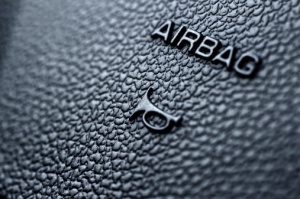- ATV accidents
- Brain Injuries
- Bus Accident
- Car Accidents
- Construction Accident
- Distracted Driving
- Drugged Driving Accident
- DUI
- Firm News
- Mass Tort
- Medical Malpractice
- Motorcycle Accidents
- Pedestrian Accidents
- Personal Injury
- Product Liability
- Safety
- Social Security Disability
- Truck Accidents
- Vehicle Accidents
- Workers Compensation
- Workplace Injuries

Auto owners, it’s crucial to heed your recall notices. Nearly 8 million vehicles from a widening group of manufacturers have been recalled for faulty airbags that have killed at least four people, officials say.
The defective airbags, made by the Takata Corp., explode too powerfully. That causes the metal devices inside the airbag to break, showering vehicle occupants with metal and plastic.
The National Highway Traffic Safety Administration (NHTSA) has sent letters to Takata urging them to speed up the production of replacement airbags. Letters also have been sent to U.S. automakers pressuring them to expedite the process of notifying owners of the potentially deadly defect.
If you have received a recall notice already, take your vehicle in for replacement of the defective parts. Supplies may be limited, and you can’t afford to wait months before getting replacement airbags. Even now, Toyota is encouraging its drivers to deactivate the front passenger seat airbag and to prevent anyone from riding there.
If you do not know whether there is an open recall on your vehicle, you can do several things:
- Go to the automaker’s website and check your VIN (vehicle identification number) for recalls. The VIN is usually located on the corner of the driver’s side dashboard where it meets the windshield. If it’s not there, open the driver’s side door and look where it latches on the door post. The NHTSA provides a list of manufacturers here.
- Sign up for recall notices from the NHTSA, which arrive before manufacturers’ notices.
- Look at the NHTSA’s most recent list of affected vehicles below. Keep checking back to make sure your make and model isn’t added to the list.
As of Oct. 22, the list includes:
BMW: 627,615 total number of potentially affected vehicles
2000 – 2005 3 Series Sedan
2000 – 2006 3 Series Coupe
2000 – 2005 3 Series Sports Wagon
2000 – 2006 3 Series Convertible
2001 – 2006 M3 Coupe
2001 – 2006 M3 Convertible
Chrysler: 371,309 total number of potentially affected vehicles
2003 – 2008 Dodge Ram 1500
2005 – 2008 Dodge Ram 2500
2006 – 2008 Dodge Ram 3500
2006 – 2008 Dodge Ram 4500
2008 – Dodge Ram 5500
2005 – 2008 Dodge Durango
2005 – 2008 Dodge Dakota
2005 – 2008 Chrysler 300
2007 – 2008 Chrysler Aspen
Ford: 58,669 total number of potentially affected vehicles
2004 – Ranger
2005 – 2006 GT
2005 – 2007 Mustang
General Motors: undetermined total number of potentially affected vehicles
2003 – 2005 Pontiac Vibe
2005 – Saab 9-2X
Honda: 5,051,364 total number of potentially affected vehicles
2001 – 2007 Honda Accord)
2001 – 2002 Honda Accord
2001 – 2005 Honda Civic
2002 – 2006 Honda CR-V
2003 – 2011 Honda Element
2002 – 2004 Honda Odyssey
2003 – 2007 Honda Pilot
2006 – Honda Ridgeline
2003 – 2006 Acura MDX
2002 – 2003 Acura TL/CL
2005 – Acura RL
Mazda: 64,872 total number of potentially affected vehicles
2003 – 2007 Mazda6
2006 – 2007 MazdaSpeed6
2004 – 2008 Mazda RX-8
2004 – 2005 MPV
2004 – B-Series Truck
Mitsubishi: 11,985 total number of potentially affected vehicles
2004 – 2005 Lancer
2006 – 2007 Raider
Nissan: 694,626 total number of potentially affected vehicles
2001 – 2003 Nissan Maxima
2001 – 2004 Nissan Pathfinder
2002 – 2004 Nissan Sentra
2001 – 2004 Infiniti I30/I35
2002 – 2003 Infiniti QX4
2003 – 2005 Infiniti FX35/FX45
Subaru: 17,516 total number of potentially affected vehicles
2003 – 2005 Baja
2003 – 2005 Legacy
2003 – 2005 Outback
2004 – 2005 Impreza
Toyota: 877,000 total number of potentially affected vehicles
2002 – 2005 Lexus SC
2002 – 2005 Toyota Corolla
2003 – 2005 Toyota Corolla Matrix
2002 – 2005 Toyota Sequoia
2003 – 2005 Toyota Tundra

